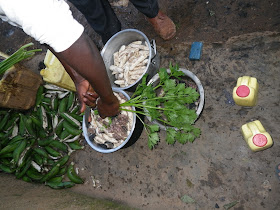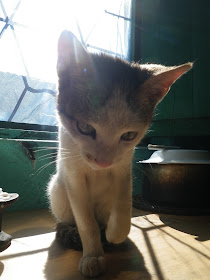During BE Camp I taught a 90 minute lesson on communication
skills.
As I’ve mentioned before, I am a strong believer in direct
communication. Rwandan culture disagrees with me. Nevertheless, I prevail.
 |
| Girls from my community who came to Camp GLOW |
I began each lesson (students rotated through four lessons
each day, so I taught the same lesson to four different groups of
thirteen students) with the telephone game. I whispered something silly into
the ear of the boy next to me, who repeated it to the boy next to him, and so
on until the last student said aloud what he heard. “The elephant wears purple
shoes” turned into “I love you”. Obviously, good communication is important!
Next, I instructed each student to draw one picture of
themselves with power, and one without power. When volunteers came forward to
explain their drawings and talk about how each position made them feel, I was
overwhelmed by the answers, so indicative of Rwandan culture. Almost every
student drew a picture of a man in a suit,
often with a briefcase, a nice house, and a car. “When you have power, you have
money, and all things are possible.” Nearly all the students who shared their
interpretations of no power had drawn themselves as farmers, with a hoe in hand
and dirty clothes. “When you are poor you have no power.”
I then asked the students if they behaved and spoke
differently to people with power. The question received
overwhelming affirmative answers. To drive the point home, I asked: “What would
you do if a primary school student took your ball away? What would you say to
him to get it back?” “We would beat him!” was the most common answer. “Now,
imagine the headmaster took your ball away, what would you do to get it back?
What would you say?” Most of the students agreed they wouldn’t even bother
asking for it.
Together, the students made a long list of behaviors that
were aggressive and another of behaviors that were passive. Aggressive
behaviors can hurt the person you are talking to, and passive behaviors can
hurt yourself. How can we communicate without hurting?
Defining assertive was tricky for several reasons. The
lesson was conducted mostly in Kinyarwanda. During
the training of trainers, my Rwandan co-facilitator listed many words in
Kinyarwanda that he interpreted as assertive, given my English explanation. Several
of the words he suggested had connotations I knew were in fact negative. As I’ve mentioned before, in Rwandan to have good culture often involves
shutting up. (For example, even in professional settings, many professional Rwandans will whisper when talking to a superior,
because traditionally it is considered a sign of disrespect to speak or
otherwise act in a way that is equal to your superior.) However, through
careful and lengthy explanations we got the point across and agreed on culturally
appropriate and effective ways to assert ourselves. My new favorite Kinyarwanda
word: kumvicana, to understand
each other.
 |
| Making clay cell phones during arts & crafts |
I was very pleased with the students’ participation and the
list of assertive actions they came up with. The most telling part of the
lesson, of course, was the final application section in which students acted
out scenarios. In one class, I started by taking a pen from a student. Thierry,
one of the brightest and most engaged students, looked confused.
“I took your pen Thierry, what are you going to do?” I
asked.
Bashfully, he responded, “It’s ok, I have another pen.”
Well, ok, we’ve identified passive behavior. “Let’s try
again, Thierry. Come forward. I took your pen! How can you ask for it back?
What can you say?”
“Okay, teacher” he came forward reluctantly. “If you have
taken my pen… I guess I will come to you and tell you that you are my friend,
and up until now we have had no problems. I can tell you that I am your friend,
and you can always talk to me and ask me for advice if you have problems“.
The passive format was all too similar to so many of the conversations I hear in Rwanda, which lead to so many of the conflicts I witness, and why I believe so strongly that teaching assertive communication is absolutely essential. So again, the
class reviewed characteristics of assertive behavior and communication.
“Let’s
try again, Thierry. I took your pen, ask for it back assertively.”
“Hi Alma, can I please have my pen back?”
“Yes, Thierry, you can!”














